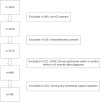Association of emotional support with quality of life, mental health, and survival in older adults with gastrointestinal malignancies-Results from the CARE registry
- PMID: 37644881
- PMCID: PMC10557900
- DOI: 10.1002/cam4.6477
Association of emotional support with quality of life, mental health, and survival in older adults with gastrointestinal malignancies-Results from the CARE registry
Abstract
Background: Emotional support (ES) is the most frequently reported support need among older adults with cancer. Yet, the association of ES with cancer outcomes is largely unknown. This study examined the association of ES with health-related quality of life (HRQoL), mental health, and survival among older adults with gastrointestinal (GI) malignancies.
Methods: We included newly diagnosed older adults (≥60 years) with GI cancer undergoing self-reported geriatric assessment at their first clinic visit. ES was measured using an adaptation of the Medical Outcomes Study (dichotomized adequate ES vs. inadequate ES). Outcomes included physical and mental HRQoL, anxiety, depression, and survival. Multivariable linear regression evaluated the association between ES and HRQoL scores. Multivariable logistic regression evaluated the association of ES with anxiety and depression. All models were adjusted for age at geriatric assessments, race, sex, and cancer type/stage.
Results: 795 participants were included. Median patient age was 68 years (IQR: 64-74), 58% were male, and most cancers were either colorectal (37.9%) or pancreatic (30.8%). Most (77.6%) had adequate ES. Patients with inadequate ES were more likely to be Black (31.5 vs. 20.8%, p = 0.005), disabled (24.1 vs. 10.4%, p < 0.001), widowed/divorced (54.2 vs. 24.8%, p < 0.001) and had lower physical and mental HRQoL t-scores (Physical β: -3.35, 95% CI: -5.25, -1.46; Mental β: -2.46, 95% CI: -4.11, -0.81) and higher odds of depression (aOR: 2.22, CI: 1.34-3.69). This study found no difference between those with adequate ES versus inadequate ES in the proportion of deaths within 1 year of diagnosis (24.3% vs. 24.2%, p = 0.966), or within 2 years of diagnosis (32.4% vs. 33.2%, p = 0.126).
Conclusions: Older adults with inadequate ES have worse physical and mental HRQoL and higher odds of depression compared to those with adequate ES.
Keywords: aging; cancer; emotional support; geriatric oncology; health-related quality of life.
© 2023 The Authors. Cancer Medicine published by John Wiley & Sons Ltd.
Figures
Similar articles
-
The association of polypharmacy with functional status impairments, frailty, and health-related quality of life in older adults with gastrointestinal malignancy - Results from the Cancer and Aging Resilience Evaluation (CARE) registry.J Geriatr Oncol. 2022 Jun;13(5):624-628. doi: 10.1016/j.jgo.2021.12.010. Epub 2022 Jan 5. J Geriatr Oncol. 2022. PMID: 34998720 Free PMC article.
-
Association of malnutrition with geriatric assessment impairments and health-related quality of life among older adults with gastrointestinal malignancies.Cancer. 2020 Dec 1;126(23):5147-5155. doi: 10.1002/cncr.33122. Epub 2020 Sep 4. Cancer. 2020. PMID: 32885848 Free PMC article.
-
Pain among older adults with gastrointestinal malignancies- results from the cancer and aging resilience evaluation (CARE) Registry.Support Care Cancer. 2022 Dec;30(12):9793-9801. doi: 10.1007/s00520-022-07398-4. Epub 2022 Nov 4. Support Care Cancer. 2022. PMID: 36329186
-
Anxiety is Associated With Geriatric Assessment Impairments and Reduced Quality of Life Among Older Adults With Colorectal Cancer: Results From the CARE Registry.Clin Colorectal Cancer. 2023 Dec;22(4):383-389. doi: 10.1016/j.clcc.2023.08.001. Epub 2023 Aug 5. Clin Colorectal Cancer. 2023. PMID: 37743126 Free PMC article. Review.
-
Psychosocial interventions for preventing and treating depression in dialysis patients.Cochrane Database Syst Rev. 2019 Dec 2;12(12):CD004542. doi: 10.1002/14651858.CD004542.pub3. Cochrane Database Syst Rev. 2019. PMID: 31789430 Free PMC article.
Cited by
-
Evaluation of functional capacity and risk of depression in older patients with cancer as part of the comprehensive geriatric assessment.Front Aging Neurosci. 2025 May 16;17:1595336. doi: 10.3389/fnagi.2025.1595336. eCollection 2025. Front Aging Neurosci. 2025. PMID: 40454204 Free PMC article.
-
Online peer support for mental health in individuals with post-acute sequelae of COVID-19: A pre-post pilot study with mixed methods.PCN Rep. 2024 Aug 18;3(3):e238. doi: 10.1002/pcn5.238. eCollection 2024 Sep. PCN Rep. 2024. PMID: 39157302 Free PMC article.
-
Factors influencing quality of life in early-stage upper gastrointestinal cancer patients in Nanchong city: a qualitative study.Am J Transl Res. 2024 Jul 25;16(7):3427-3436. doi: 10.62347/EZON6207. eCollection 2024. Am J Transl Res. 2024. PMID: 39114679 Free PMC article.
-
Navigating life after gastric cancer surgery: a qualitative exploration of the dyadic patient-caregiver perspective on quality of life outcomes.BMC Cancer. 2025 Feb 18;25(1):288. doi: 10.1186/s12885-025-13696-x. BMC Cancer. 2025. PMID: 39966806 Free PMC article.
References
Publication types
MeSH terms
Grants and funding
LinkOut - more resources
Full Text Sources




